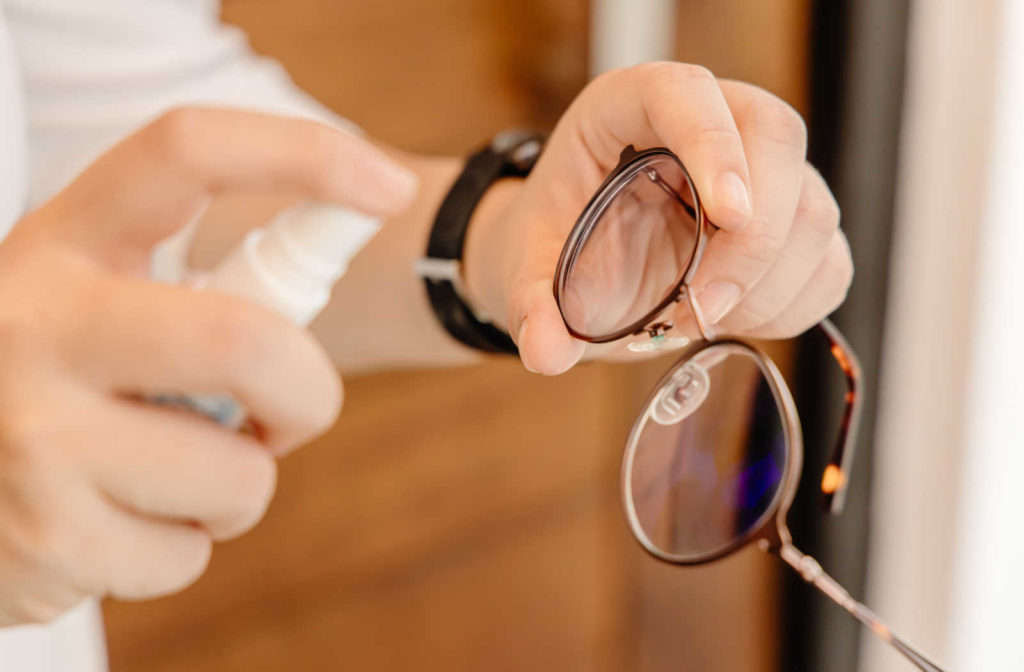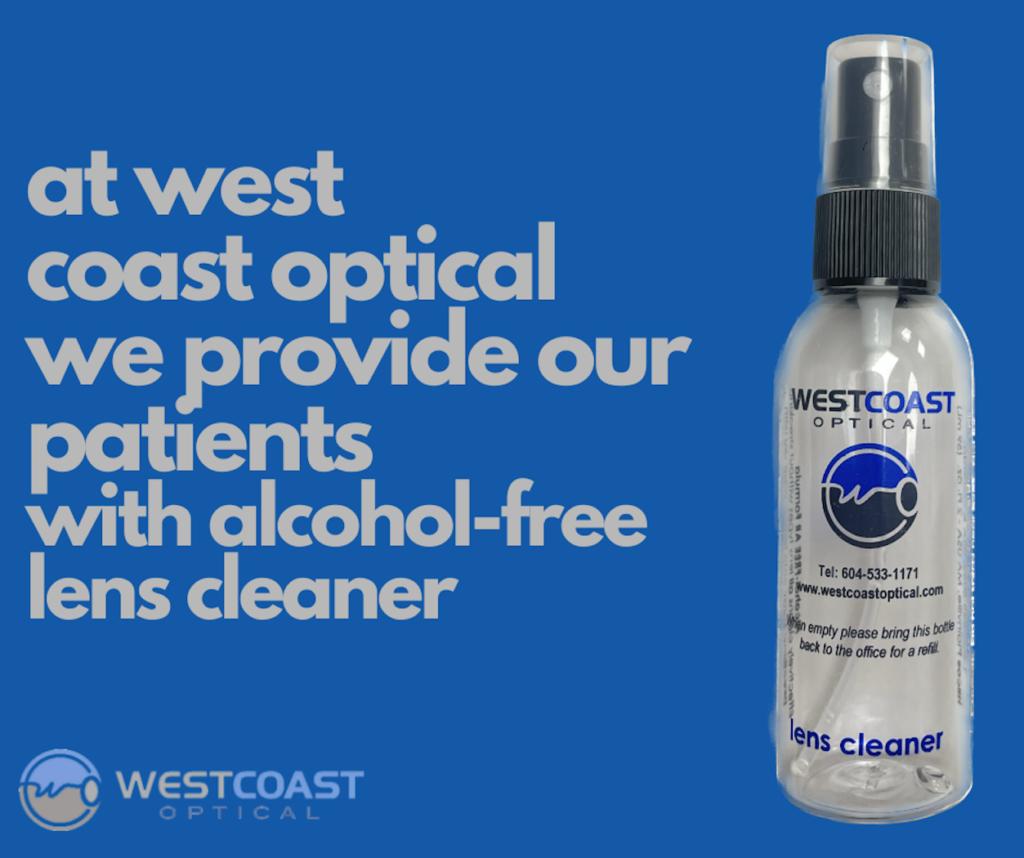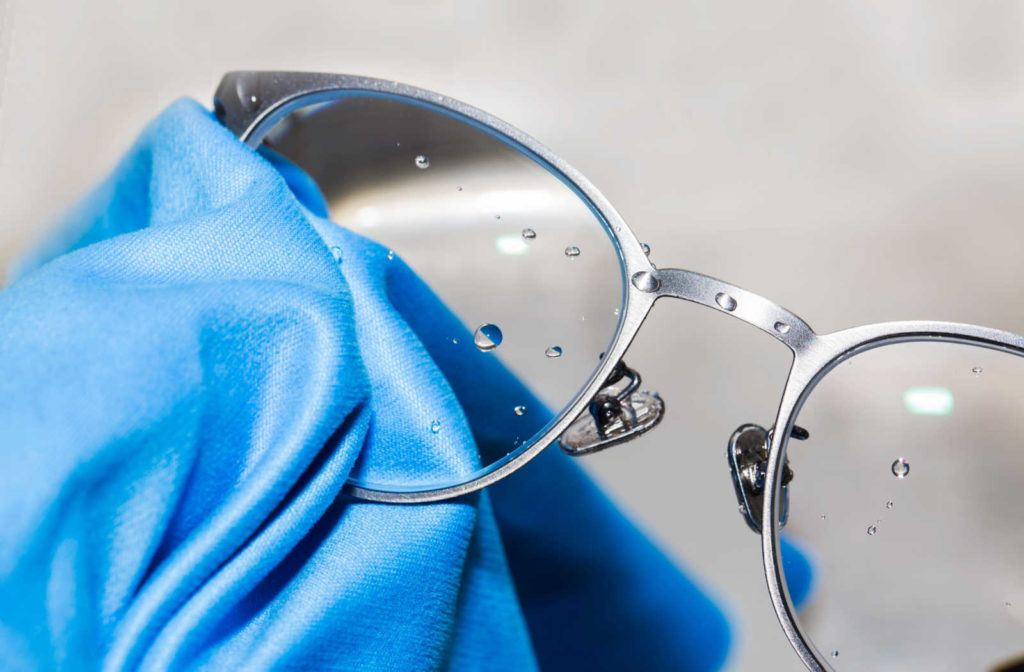Anyone familiar with their favourite eyewear, whether sunglasses or prescription eyeglasses, knows how easily your lenses can get dirty. You adjust your glasses absent-mindedly, and your fingerprint adds a smudge. A windy day outside can cake on layers of dust and debris. Daily wear often causes daily buildup on your glasses.
An eyeglass cleaning solution is best, but what happens when you run low? Instead of running out to buy more, can you use Windex?
Unfortunately, you should never use glass cleaner on your glasses. Windex can be harmful to your lenses as it causes deterioration to lens treatments.
How Can Glass Cleaner Harm Your Lenses?
Eyeglass lenses are not made of glass. Although there was a time when manufacturers made spectacles from glass, today’s eyewear features various durable plastics. The materials are safer as the lenses can keep up with most daily wear.
Window or glass cleaner may be appropriate for your windows, but you should never use it on your eyewear. The chemicals in window and household cleaners can be abrasion, stripping away the lens’ coating. When you have lens treatments, such as anti-glare or UV filters, the harsh chemicals can deteriorate the quality of the treatment.
Be careful of using DIY or homemade glasses cleaners, including recipes containing acetone or rubbing alcohol. In addition to breaking down unwanted substances, these substances can also break down lens coatings. Also, achieving accurate measurements can be challenging with a DIY project, so it can increase the chance of overpowering your solution with harsher materials.
It’s crucial to use a gentle cloth when wiping your lenses. Many of us have turned to a t-shirt or paper towel but a paper towel, napkin, or any fabric made of rougher material can easily scratch your lenses or leave behind lint. Instead, look for a microfibre cloth. The smaller fibres can pick up dirt and tiny debris more easily, plus it’s gentler material for your lenses.

What Can You Use to Clean Your Glasses?
A glasses-cleaning solution is best when it comes to cleaning your glasses. The solution is safe on your lenses and effective against typical stains, smudges, and debris. However, what happens when you run low unexpectedly? What can you do when you leave a fingerprint on your lenses while away from your cleaning solution?
When necessary, there are alternatives you can use to help remove dirt and grime from your lenses.
Water
Lukewarm tap water can help wash away any debris clinging to your glasses. Additionally, water is gentle on any lens treatments you may have, rather than an abrasive glass cleaner. Unfortunately, plain water is also less effective against grease and stubborn debris.
After rinsing your lenses, you can wipe your lenses with a microfiber cloth to wipe away any remaining dirt and disperse any oil buildup. Rubbing the lenses may not remove all the grime, but it can remove any clumps or dust clinging to your lenses.
Dish Soap
Mild dish soap can break up debris and smudges. Notably, it should be a mild detergent (lotion-free), not hand soap. Dish soap with lotions, oils, or other additives can leave a layer of grime after cleaning. In addition, any unknown materials can potentially deteriorate lens treatments.
Use a small amount (a tiny dot) and thoroughly rinse your lenses after cleaning. Again, use a gentle microfibre cloth to avoid scratching your lenses. Dish soap is one of the safest alternatives when you run low on eyeglass cleaner.
How to Clean Your Glasses
When you have the time and the recommended materials, here’s how to clean your glasses:
- Wash your hands. When possible, wash your hands first! Clean hands reduce the chance of transferring germs or immediately re-smudging your lenses.
- Rinse your glasses with lukewarm water. The water washes away loose dust and debris. Avoid hot or boiling water, as it can damage lens treatments.
- Wipe away excess water. Use a microfiber or gentle cloth to remove excess water.
- Apply a glasses-cleaning solution. Spray both sides of your lenses. Typically 1–2 sprays for each side should offer enough coverage.
- Gently rub the frames clean. Using a microfiber or gentle cloth, rub both sides of your lenses. Remember to clean the sides of the frames and the nosepiece too! Skin cells and oils can cling to the material, leading to bacteria buildup.
When you’ve run out of a glasses cleaning solution, substitute a gentle dish soap for step 4 (until you can replace your supply).
You can use a microfiber cloth several times before it needs washing. However, when clearing a lot of daily grime, you may need to have a few cleaning cloths at the ready. Microfiber cloths can be washed, just with gentle or mild detergent and no fabric softener.
Visit Us for More Eyewear Tips
We want to help you get the most out of your eyewear. Determining your prescription is only one part of your eye care, and we want to support you throughout your visual journey. Whether you need to update your lenses to suit your lifestyle or you’re looking for a few daily care tips, we can help.
Book an appointment at West Coast Optical to discuss personalized eyewear and eye care needs.




